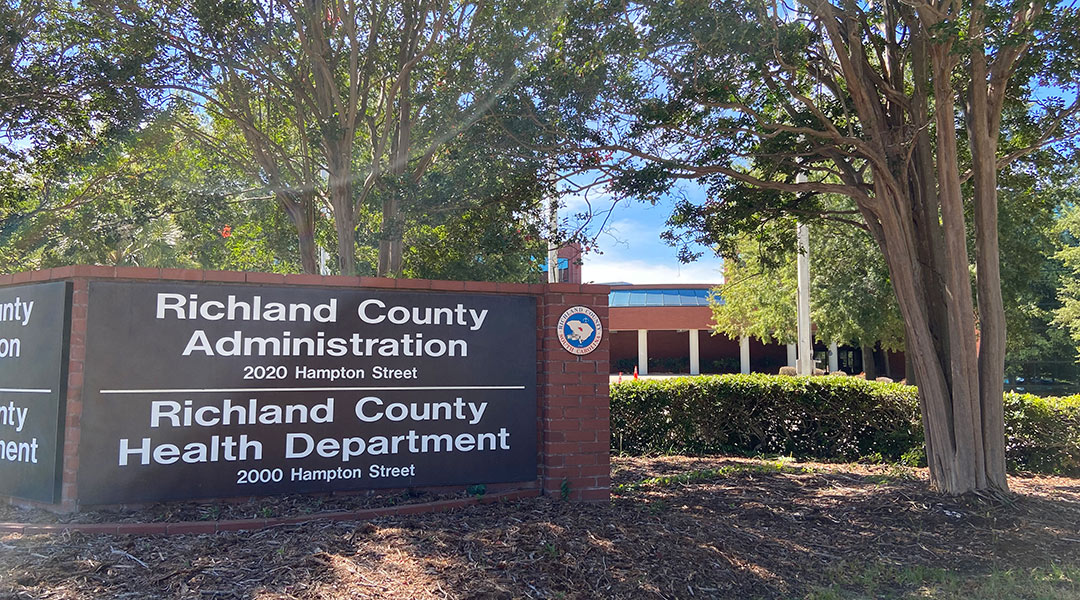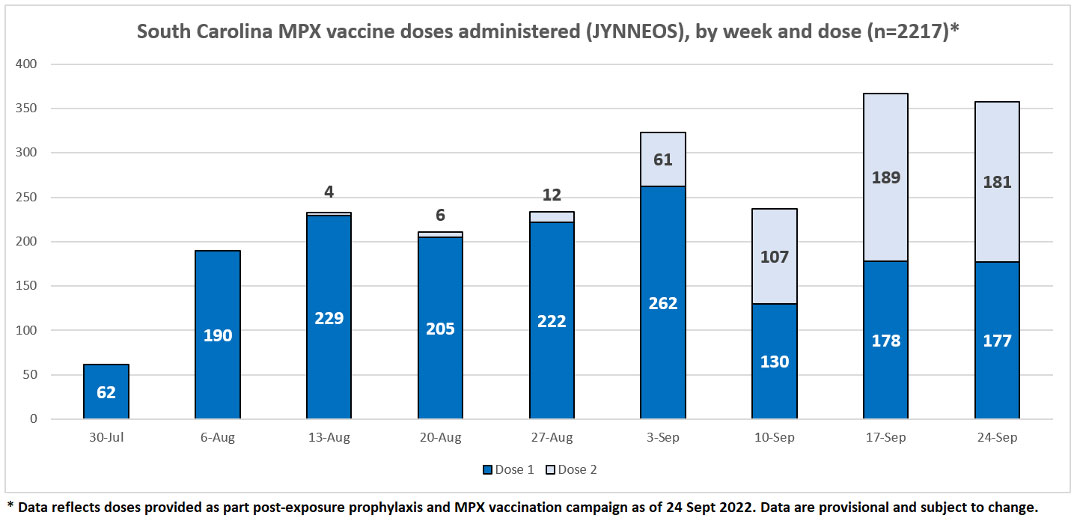The South Carolina Department of Health and Environmental Control building at 2000 Hampton Street, one of four locations in the Midlands offering the monkeypox vaccine (Photo by Caleb Bozard)
With monkeypox receiving attention on social media and being declared a public health emergency by the World Health Organization, Columbia area healthcare officials and providers are offering vaccines to certain members of the community.
The South Carolina Department of Health and Environmental Control only recommends the vaccine to “any man who has sex with men, including gay or bisexual men, transgender, or gender non-conforming individuals” and anyone using the HIV treatment PrEP, according to DHEC’s website.
The vaccines also are being offered to high-risk close contacts of those who test positive in compliance with CDC guidelines, according to DHEC. Those who test positive are recommended to isolate. But close contacts who have been exposed are not, said DHEC’s Jonathan Knoche.
“Unlike COVID-19 or other viruses that pose a larger threat to the public, MPX vaccinations at this time are not recommended for the general population because of the specific way the virus spreads,” the agency’s website said. “They are currently only recommended for those who are part of high-risk groups.”
M. Greg Green is a member of a high-risk group DHEC is targeting and received the first dose of the recommended two six weeks ago.
“(The appointment) was relatively simple to set up,” Green said. “I just called the DHEC number, answered ‘yes’ to all the questions they asked and made the appointment.”
Green said he was frustrated with the pre-screening questions because they seemed to be focused on gay men, while he idenitifes as pansexual.
“That’s not how I identify, but I also knew that I needed to say ‘yes’ to all the questions so I was able to get the vaccine,” Green said.
There were 65 confirmed MPX cases in the Midlands and a total of 169 statewide as of Friday, Sept. 30, according to DHEC.
Data from Sept. 24 show MPX cases have been on the decline in the state since peaking at 26 cases reported during the first week of August.
The vaccine’s two doses are given four weeks apart to maximize their effectiveness, according to the CDC. Before Aug. 29, the vaccine was given in a single dose.
The vaccine is injected into the surface layer of the skin rather than deeper tissue, according to DHEC.
“The first shot they gave kinda like in my tricep, versus in the shoulder,” Green said. “So it actually didn’t hurt as bad — like that soreness when you get shots wasn’t as bad because of the location.”
Green said the second shot did cause some redness and swelling, which went down in about a week.
More than 1,600 first doses have been administered in South Carolina as of Sept. 24, according to DHEC.
“Our current strategy is really to prevent monkeypox from spreading by vaccinating those who are at the highest risk,” Knoche said.
Though MPX is related to smallpox, the symptoms are not usually as severe. MPX is not related to chicken pox, and the chicken pox vaccine does not offer protection from MPX, Knoche said.
Green said he felt confident in the MPX vaccine because it isn’t new. The Jynneos vaccine given to prevent MPX was first approved in 2019, according to the U.S. Food and Drug Administration.
Green said he also wanted to get the vaccine to prevent the spread of another disease after navigating the COVID-19 pandemic.
“Some people are very anti-vaccines,” he said. “I’m the exact opposite of that. If there’s something that I can get to keep me from getting something, then I’m gonna do my best not to get it.”
Green said he didn’t know many others who have gotten the vaccine. He knows several people — mostly cisgender women, he said — who wanted to get the vaccine but they didn’t think they qualified.
“Because it was being promoted as a gay STD, they just felt like they weren’t able to get it,” he said. “I don’t know if they were denied or they didn’t try. I’m not certain.”
Symptoms of monkeypox include rash, fever, head and muscle aches and swollen lymph nodes. The symptoms usually appear seven to 14 days after exposure, according to DHEC.
Knoche said while it is possible for the virus to spread by respiration or on surfaces, the most efficient transmission is by prolonged contact with sores caused by the infection, especially during sexual contact. He said the MPX risk for the general public is low, which is why DHEC’s messaging has mainly targeted at-risk groups.
The sores start off as red bumps, before becoming filled with pus and then scabbing over. A person is considered infectious until the scabs fall off and new skin grows underneath, Knoche said.
Most cases do not cause serious long-term effects, he said. He recommended being honest in asking about symptoms if potentially having sexual contact with someone.
DHEC and private clinics are currently providing the vaccine to recommended individuals at four locations within a 20-mile radius of downtown Columbia – all in Richland County – according to DHEC’s website.
Vaccine appointments, which are required, and clinic locations can be found online via DHEC’s website or by calling (855) 472-3432.
DHEC reports the number of monkeypox vaccine doses administered in South Carolina has increased overall since July 30. Second doses of the vaccine have made up an increasing portion of the overall numbers in the past few weeks. The data is broken down by week and dose number. (Graphic courtesy of the S.C. Department of Health and Environmental Control)



